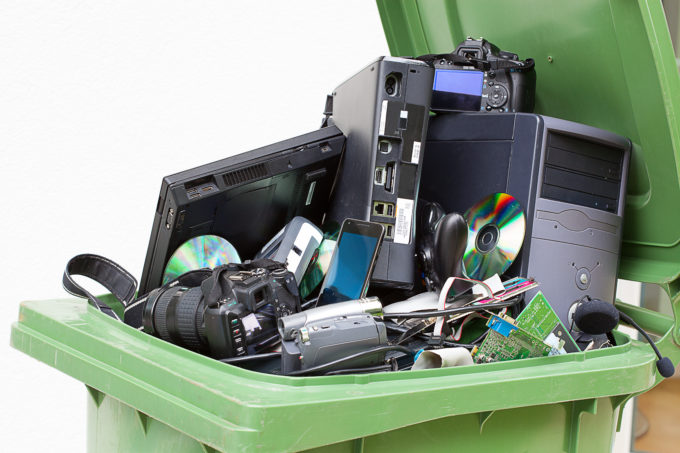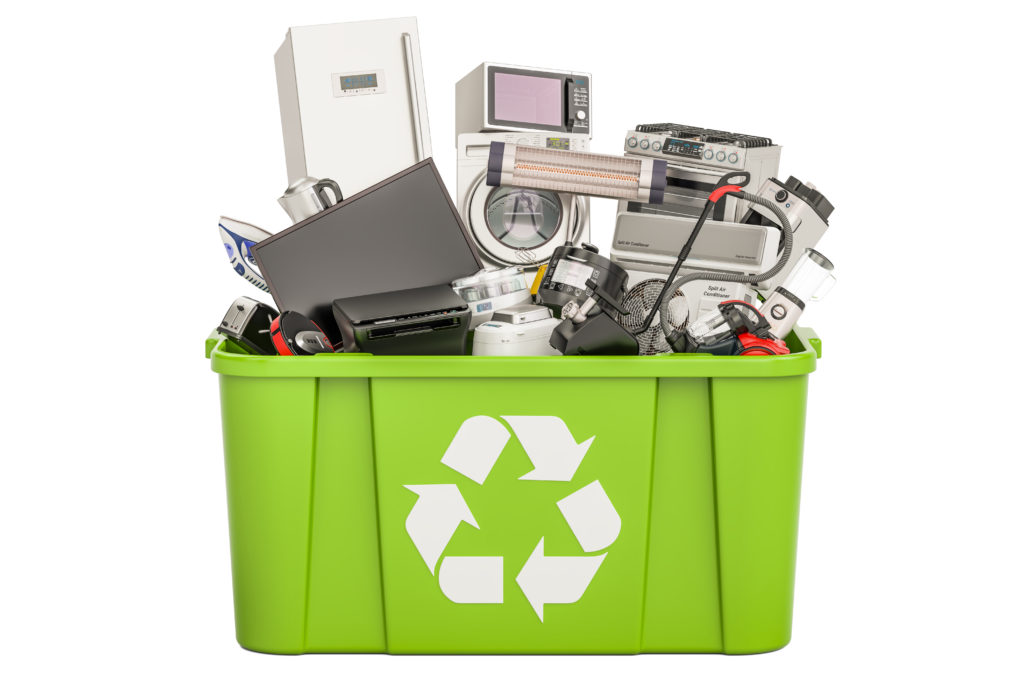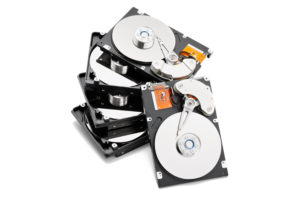Recycling Computer Parts

Many people are concerned that recycling computer parts will expose data on their devices. In actuality, it is the tossing away of these electronic devices that puts them at a greater risk. If the recycling process isn’t done right, you increase the chance of cybercriminals stealing your sensitive personal and financial information.
The Risk of Data Theft
Because the risk of falling victim to data theft is increasing, you should always use a professional and reputable service provider for your laptop and hard drive recycling.
Consider this scenario from Massachusetts Institute of Technology (MIT):
“Two MIT students purchased 158 used disk drives from various locations and found more than 5,000 credit card numbers, medical reports, detailed personal and corporate financial information, and several gigabytes worth of personal e-mail and pornography on those drives.”
You can’t just discard hard drives or move files into your device’s recycle bin. When recycling your computer parts, you must destroy any data left on hard drives.
While it makes it much harder to recover the information on these devices, a computer specialist who specializes in data retrieval would be able to recover most of the data that existed before being erased.
How Do You Prevent Data Theft?
So how do you keep your family and your business information safe from those that are looking to commit identity theft, ransomware crimes, phishing emails, and doxxing (the public revelation of personal information)?
The answer is to properly dispose of these devices and recycle your computer and computer parts. Here we will show what this process looks like and what to look for in a tech recycling company.
How Can You Recycle Computers & Computer Parts?

It’s easy to dispose of an old computer, laptop, and smartphone. But, how to do it safely is another matter. Most people think that burying these devices at the bottom of their trash bin will get them to a landfill, where they will no longer be accessible. This thinking is exactly what hackers and computer criminals want you to believe.
Every year, a new wave of computing technology appears in the stores. And, at some point, these same companies no longer support old technology. This forces the consumer to discard old devices for the latest and greatest computer, smartphone, laptop, or tablet.
You have three options when recycling computer parts. The first is to donate your devices to a charity after they have been scrubbed clean. The second option is to resell or trade-in your computer to a manufacturer or service provider that accepts old technology. Both these options still leave you open to personal data being recovered and stolen.
The Best Method of Recycling Computer Parts
Your best bet is with the third option: to take your old computer and/or parts, including motherboards, laptops, and hard drives to a reputable electronics recycling service provider.
Opting for hard drive or laptop recycling from a professional provider like High Tech Recycling will give you peace of mind; they will ensure that your financial and personal data can never be recovered or reused.
Additionally, recycling computer parts is an environmentally safe way to dispose of your devices. Many consumers don’t know that computers contain a host of toxic chemicals and metals like lead, mercury, cadmium, brominated flame retardants (BFRs) and polyvinyl chloride (PVC). So, recycling computer parts is not only safer than tossing them in landfills, but also eco-friendly.
Benefits of Recycling Computer Parts
In addition to being environmentally safe and more secure than other electronic disposal methods, recycling computer parts also provides other benefits. Namely, its ability to lower e-waste.
How Recycling Reduces E-Waste
Landfills are full of plastic and metal components from old electronic devices (called e-waste). Both these materials decompose so slowly that it would take thousands of years for those chemicals to be eliminated. And, while the plastic and metal are decomposing, toxic chemicals are being leached into the soil, then into groundwater. This same groundwater from landfills will eventually end up in our country’s waterways—which will then end up in our communities.
So, the most important benefit of recycling computer parts is that the materials are separated and reused to make new components or products. Instead of ending up in landfills, old computer parts that contain reusable metal and plastics can be melted down to make new components.
Promoting Economic Success & More
Recycling computer parts can also aid in new job creation. Whether your local recycling service is a small business owner or part of a larger national chain, as consumers recycle more products, this industry will continue to grow.
When you recycle your old computer parts, you can also donate usable technology to local charities. Many of these charities donate electronics to seniors and young people who would otherwise not be able to afford them.
Now that you know more about the benefits of recycling computer parts, read on to learn more about how to recycle specific parts, including hard drives and monitors.
Recycling Your Hard Drive

Hard drive recycling deserves special attention. Why? Because hard drives hold the memory of all documents, and other information that was stored on a desktop computer or laptop.
It takes an expert to completely wipe a computer hard drive clean. While you can simply physically destroy the hard drive, recycling centers will use a combination of erasure and formatting procedures that are proven to destroy all data, at every level, and within every component.
High Tech Recycling uses a professional degaussing machine that permanently erases the data from hard drives, floppy disks, and data tapes. Degaussing erases a hard drive or data tap using a demagnetizing process. Additionally , High-Tech uses hard drive recycling procedures that are compliant with the Department of Defense’s 5220.22 M standard.
Computer Monitor Recycling
The best way to dispose of an old computer monitor is by taking it to a service that specializes in recycling computer parts. These companies can take old computer monitors and television sets that contain plastic, glass, and metal. Then, electronics recycling providers will separate each part and determine whether they can be reused, recycled, or disposed of.
Computer monitors also contain many toxic chemicals that can damage the environment and/or wildlife. The responsible way to recycle old computer monitors is to take them to an electronics recycling center.
Laptop Recycling
Most people buy a new laptop every two years. This is because new models are always coming out, and many people want newer laptops that are faster, have more memory, or feature larger display screens. Considering this, that means there are tens of thousands of laptops and tablets that are thrown away every year.
Laptop recycling reclaims precious metals like gold and silver, along with carbon steel alloys that can be reused to make other components. According to the EPA, laptop recycling can save energy that is equivalent to the electricity used by more than 3,500 U.S. homes in a year.
Professional laptop recycling starts by completely wiping the device clear of any data. Then, the products are dismantled to reuse some components. The rest of the metal and plastic is either recycled or separated and properly disposed of.
Learn More From High Tech Recycling Today
Visit High-Tech Recycling online today to learn more about recycling computer parts. We’ve provided professional hard drive and laptop recycling services since 2011, and serve the entire Detroit, MI, area.
When you turn to us, you’ll discover how easy recycling computer parts can be. Best of all, we are a reputable service that prioritizes the erasure and formatting of hard drives, disk drives, tapes, and chips. If you want to learn more about our services, fill out our online form today.
